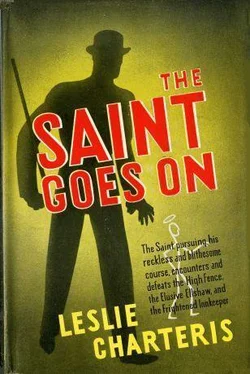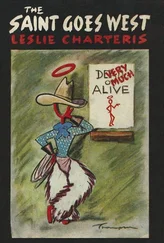It was not much consolation for him to realise that the Saint would never have given him the information even if he had asked for it. Simon Templar's idea of criminal investigation never included any premature intrusions by the Department provided by London's ratepayers for the purpose, and he had his own methods of which that admirable body had never approved.
He went out of Scotland Yard and walked round to Parliament Square with a strange sensation going through him as if a couple of dozen fleas in hobnailed boots were playing hopscotch up and down his spine. The sensation was purely psychic, for his nerves were as cold as ice, as he knew by the steadiness of his hand when he stopped to light a cigarette at the corner of Whitehall; but he recognised the feeling. It was the supernatural, almost clairvoyant tingle that rippled through his consciousness when intuition leapt ahead of logic — an uncanny positive prescience for which logic could only trump up weak and fumbling reasons. He knew that Adventure had opened her arms to him again — that something had happened, or was happening, that was bound to bring him once more into the perilous twisted trails in which he was most at home — that because a garrulous charwoman had taken it into her head to bring him her troubles, there must be fun and games and boodle waiting for him again under the shadow of sudden death. That was his life, and it seemed as if it always would be.
He had nothing much to go on, but that could be rectified. The Saint had a superb simplicity of outlook in these matters. A taxi came cruising by, and stopped when he put up his hand.
"Take me to Duchess Place," he said. "It's just at the back of Curzon Street. Know it?"
The driver said that he knew it. Simon relaxed in a corner and propped up his feet on the spare seat diagonally opposite, while the cab turned up Birdcage Walk and wriggled through the Green Park towards Hyde Park Corner. Once he roused himself to test the mechanism of the automatic in his hip pocket; once again to loosen the thin-bladed knife in its sheath under his left sleeve. Neither of those weapons were part of the conventional outfit which anyone so impeccably dressed as he was would have been expected to wear, but for many years the Saint had placed caution so far before convention that convention was out of sight.
He paid off his taxi at the corner of Duchess Place and walked up towards number six. It was one of a row of those dingy unimaginative brick houses, with rusty iron railings and shabbily painted windows, which would be instantly ranked as cheap tenement cottages by any stranger who had not heard of the magic properties of the word "Mayfair." Simon went up the steps and rang the tarnished brass bell without hesitation — he hadn't the faintest notion how he would continue when the door was opened, if it was opened, but he had gone into and emerged from a great deal of trouble with the same blithe willingness to let circumstances provide for him.
The door opened in a few moments; and circumstances proceeded to provide for him so completely and surprisingly that he was ready for some unpleasantness.
The man who looked out of the door was rather small and wiry, with thin grey hair and a sallow bird-like Cockney face on which the reddish tint of his nose stood out so unexpectedly that it looked at first sight like one of those ageless carnival "novelties" which give so much harmless pleasure to adult infants engaged in the laborious business of having a good time. With his threadbare and baggy trousers, and his pink shirt fastened together with a stud at the neck but virginally innocent of collar or tie, he looked like the very last sort of man who ought to be answering a door-bell in that expensive slum.
"I want to see Mr. Ellshaw," said the Saint, with sublime directness; and knew at once that he was talking to the man he wanted.
His first surprise was when this was admitted.
"I'm Ellshaw," said the man at once. "You're Mr. Templar, ain't yer?"
The Saint drew at his cigarette with a certain added thoughtfulness. He never forgot a face; and he was sure that this little bird with the carmine beak could not have slipped out of his mind very easily if their paths had ever crossed before. But he acknowledged the identification with outwardly unaltered amiability.
"How did you know that, Archibald?"
"I was just comin' round to see yer, guv'nor." The little man opened the door wider, and stepped back invitingly. "Would yer like ter step inside fer a minute? — I've got somefink to tell yer."
The Saint stepped inside. He put his hands in his pockets as he crossed the threshold, and one of them rested on the butt of his gun.
Ellshaw led him through the uncarpeted hall to the nearest door, which brought them into the front ground-floor room. There was hardly any furniture in it — a piece of cheap hair carpet, a painted deal table carrying a bottle and glasses and the scars of cigarette-ends, and a couple of ancient armchairs with soiled chintz covers, would have formed a practically complete inventory. There were grimy lace curtains nailed up on the windows at the street end, and a door communicating with the back room at the other. From the oak parquet floor, the tinted ceiling and tasteful electric light fittings, it was obvious that the room had once been lived in by someone of a definite class, but everything in it at that moment spoke loudly of the shoddiest stock of the secondhand sale room.
"Sit down, guv'nor," said Ellshaw, moving over to the chair nearer the window and leaving Simon no choice about the other. " 'Ow abaht a drink?"
"No, thanks," said the Saint, with a faint smile. "What is it you were so anxious to tell me?"
Ellshaw settled himself in his chair and lighted a drooping fag.
"Well, guv'nor, it's abaht me ole woman. I left 'er a year ago. Between you an' I, she 'ad a lot of bad points, not that I want to speak evil of the dead — oh, yush, I know 'ow she committed suicide," he said, answering the slight lift of the Saint's eyebrows. "I sore it in the pypers this mornin'. But she 'ad 'er faults. She couldn't never keep 'er mouf shut. Wot could I do? The rozzers was lookin' for me on account of some bloke that 'ad a grudge against me an' tried ter frame me up, an' I knew if she'd knowed where I'd gorn she couldn't 'ave 'elped blabbin' it all over the plyce."
Simon was beginning to understand that he was listening to a speech in which the little Cockney had been carefully rehearsed — there was an artificial fluency about the way the sentences rattled off the other's tongue which gave him his first subtle warning. But he lay back in his chair and crossed his legs without any sign of the urgent questions that were racing through his mind.
"What was the matter?" he asked.
"Well, guv'nor, between you an' I, seein' as you understands these things, I used ter do a bit of work on the rice trains. Nothink dishonest, see? — just a little gamble wiv the cards sometimes. Well, one dye a toff got narsty an' said I was cheatin', an' we 'ad a sort of mix-up, and my pal wot I was workin' wiv, 'e gets up an' slugs this toff wiv a cosh an' kills 'im. It wasn't my fault, but the flatties think I done it, an' they want me for murder."
"That's interesting," said the Saint gently. "I was talking to Chief Inspector Teal only a little while ago about you, and he didn't tell me you were wanted."
Ellshaw was only disconcerted for a moment.
"I don't spect 'e would've told yer, knowin' wot you are, guv'nor — if you'll ixcuse me syin' so. But that's Gawd's troof as sure as I'm sittin' 'ere; an' I wanted to come an' see yer—"
Simon was watching his eyes, and saw them wavering to some point behind his shoulder. He saw Ellshaw's face twitch into a sudden tension, and remembered the communicating door behind him in the same instant. With a lightning command of perfectly supple muscles he threw himself sideways over the arm of the chair, and felt something swish past his head and thud solidly into the upholstery, beating out a puff of grey dust.
Читать дальше












